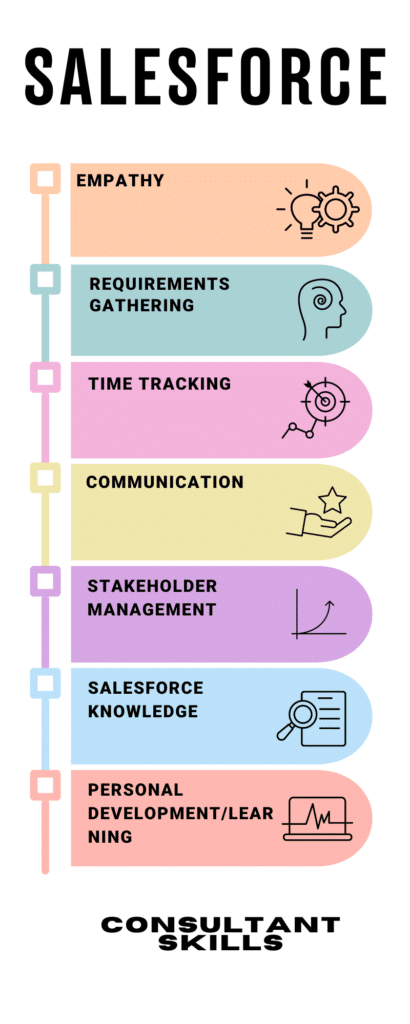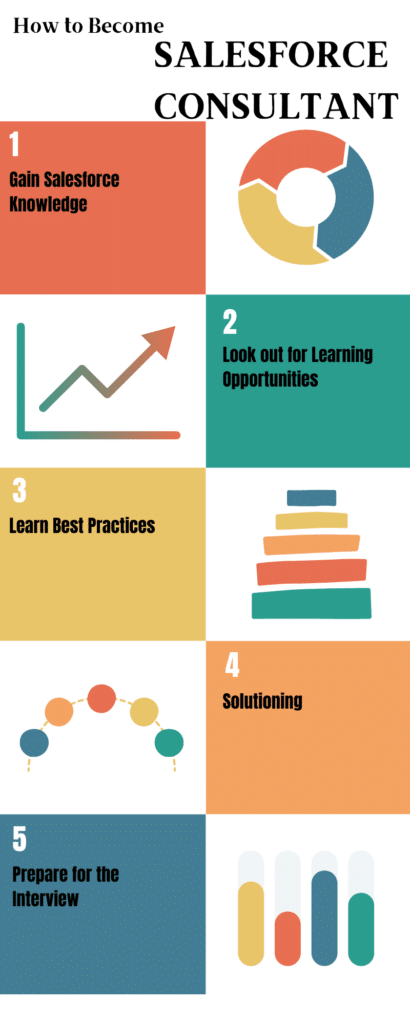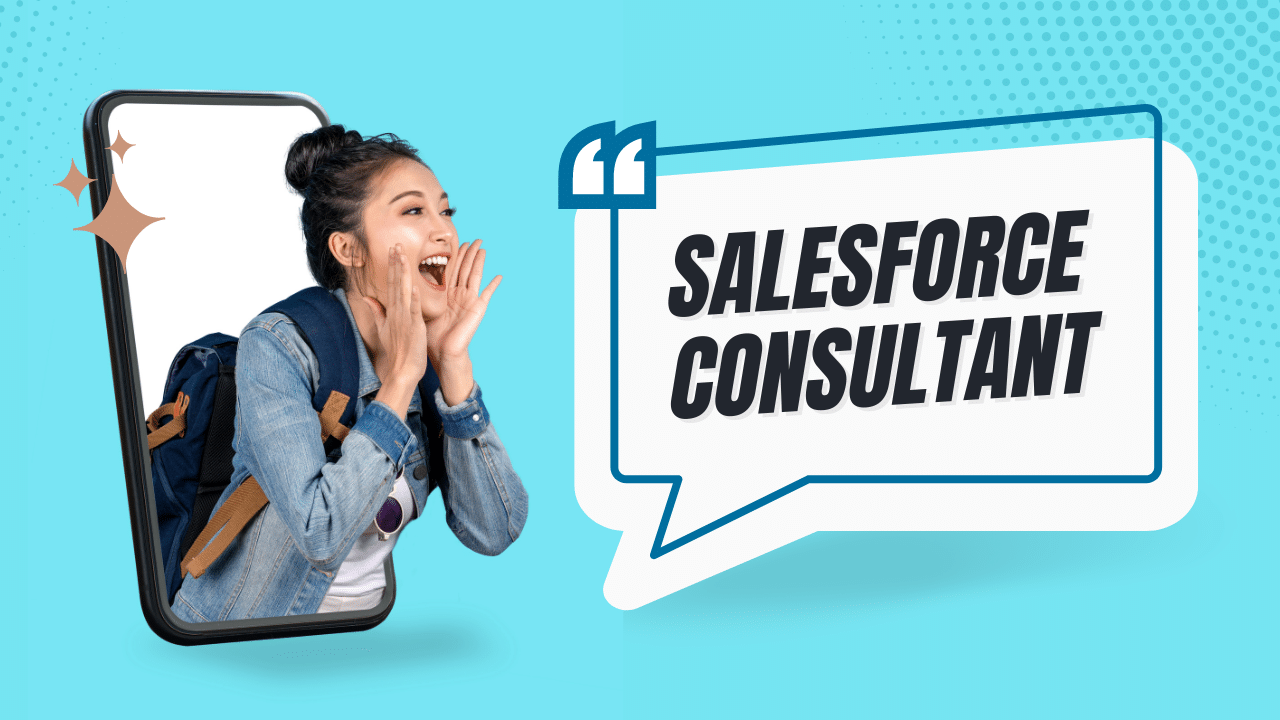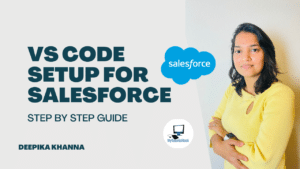Salesforce Consultants are pivotal in implementing and enhancing Salesforce solutions to suit their clients’ needs effectively and expansively.
With their expertise, Salesforce adapts seamlessly to an organization, mirroring its operational intricacies. In this article, we delve deeper into the role of a Salesforce Consultant, their modus operandi, essential skills required, and the subsequent career trajectory within consultancy.
While we emphasize administrators, transitioning into Salesforce consulting is a natural progression for various roles within the Salesforce ecosystem. Let’s delve into the details!
Table of Contents
ToggleHow to get into Salesforce Consulting?
Becoming a Salesforce Consultant is a career option for those looking for something new and challenging. Many people feel stuck in their jobs, doing the same tasks over and over again. They might feel limited in what they can learn and do. For example, some end up working with Salesforce by chance. Maybe their company starts using Salesforce and needs someone to learn how to use it well. Once they see how useful Salesforce can be, they get interested and start thinking about jobs related to it.
What are Core skills required for Salesforce Consultants?
Working on Salesforce projects is like creating a piece of art. There are many things to consider, and if you don’t get them right, the project might not succeed. Organizations are careful about who they choose to work on their Salesforce system because it’s vital to their business. They look for consultants who have different skills, including ones that aren’t about technical stuff.
Here are some important skills for Salesforce consultants:
- Empathy: Try to understand the client’s point of view as if you were in their shoes. Imagine you’re new at their company and ask questions like you need to learn everything from scratch. This skill is essential but not easy to learn.
- Requirements Gathering: It’s crucial to collect clear and accurate information about what the client needs before starting the project. If you don’t, the project might go off track, and it’ll be hard to control what needs to be done.
- Time Tracking: Keep track of how much time you spend on different tasks. This helps you stay organized and lets you know if you’re taking longer than expected. It’s also important for managing the project’s budget and your own time.
- Communication: Being able to explain things clearly is very important. You need to show how Salesforce can solve the client’s problems and make sure everyone involved understands what’s happening.
- Stakeholder Management: Make sure you understand what the client wants and keep them happy. It’s better to promise less and deliver more than the other way around. Also, take time to understand what each person involved wants so you can keep the project on track.
- Salesforce Knowledge: You need to know a lot about how Salesforce works to help others. Reflect on your past experiences with Salesforce, especially what didn’t work well, so you can avoid making the same mistakes.
- Personal Development/Learning: Consultants learn new things all the time, so it’s essential to have the right mindset. It’s okay not to know everything, but you should be willing to learn and ask for help when you need it.
If you want to learn more about what Salesforce consultants do and what a typical day looks like for them, keep reading about it.

Benefits of Choosing a career as a Salesforce Consultant
When you work at a consultancy, you’ll be part of projects and often work with different teams. Here are some good things about this way of working:
- You get to work on more complicated projects.
- You work on many projects at once, for different organizations.
- You get to use many different Salesforce products, not just Sales Cloud. For example, Service Cloud, Analytics, Einstein.
- You learn a lot about different industries. Most consultancies focus on specific industries like finance, real estate, or retail.
- You work with experts in various fields like architects, developers, marketers, and account managers.
- You have chances to learn and grow through training programs. Consultancies often want their staff to have certifications from Salesforce. Some even offer bonuses for personal development.
- You can expect a higher salary because being a consultant requires both technical and business skills.
How Do You Get There?
If you’re thinking about trying consulting, keep in mind:
- You need to have certain skills: Being organized, good at communicating, open to feedback, knowing about the Salesforce platform, and understanding how to use it well.
- Some things you can learn while working: Like how to gather requirements, manage projects (like using agile methods), figure out what needs to be done for a project, and estimate how long it will take.
If you talk to recruiters or hiring managers, they’ll tell you the same thing. As long as you understand that Salesforce is a tool for helping businesses and solving their problems, you’re on the right track!
Journey of Salesforce Admin to Consultant
Many Salesforce Admins dream of becoming consultants. Essentially, a Salesforce Consultant does similar things to an admin: finding problems in a business and fixing them using Salesforce.
But there are some differences between the two roles:
- When you finish setting up Salesforce for a company, you might have to train a new admin or help important users. Your experience as an admin will be really useful here.
- Working as a consultant means handling many projects at once, for different companies. It can be more challenging than being an admin for just one company because each client has different needs and uses different parts of Salesforce.
Transition Into Salesforce
People come to Salesforce consulting from many different paths, too many to list here! If you look at the programs available to train apprentices, graduates, veterans, refugees, and moms returning to work, you’ll see the diverse backgrounds they come from.
Don’t underestimate your past experiences, even if they’re not related to Salesforce. Consulting firms prefer candidates who have some experience with Salesforce along with knowledge of their industry. Why? Because as a consultant, being able to speak the same language, understand the way things work, and relate to client challenges builds trust and leads to successful results.
The Next Steps
Gain Salesforce Knowledge
If you want to be a Salesforce Consultant, it’s good to know how to set up Sales Cloud. This is usually where you’ll begin, unless you’re interested in focusing on marketing cloud.
If you haven’t already, you should get certifications as a Salesforce Administrator and Platform App Builder.
Look out for Learning Opportunities
If you’re working in another role at Salesforce, remember to stay aware of project kick-off meetings and training sessions. How can you make these meetings better? Are you asking enough questions to understand what your colleagues need?
Another way to try consulting is by doing Salesforce work for free. You can volunteer with a nonprofit organization that needs help. But don’t do this if you’re not experienced enough. Stick to what you know about Salesforce, so you don’t make things worse for the nonprofit.
Learn Best Practices in regards to Salesforce
Knowing the best ways to use Salesforce helps you set it up faster and in a way that helps the client for a long time (futureproofing).
This means using features the way Salesforce designed them and mostly using the easy settings.
In simple terms, don’t make big changes or add lots of code to Salesforce unless you really have to. Salesforce improves its standard features with every update, not custom parts of the system that don’t follow the main rules.
So, always think about the future when setting up Salesforce.
Get Comfortable with Solutioning
Solutioning means putting different features, automations, and sometimes other apps together to create a complete process. Take a moment to think about your design. Ask yourself questions like, “What will happen if I do this?” or “Is it okay to handle this much data?” Consider if you might run into any limits with the system.
Prepare for the Interview
Going for a job interview can be very stressful, but there are things you can do before, during, and after to do really well and improve your chances of getting the job. Here are some helpful tips and tricks.
What should you expect in an interview for a Salesforce consultant job? Well, the interviewer will want to hear about your experience. So, be ready with examples of times when you solved problems, came up with solutions, used the best methods, and communicated well (especially with tricky people).

Things I Wished I knew before
As I said before, working as a Salesforce consultant can be a very fulfilling job, but be ready to step outside your comfort zone! I’ve learned some things about consulting that I want to tell you, so you can decide if it’s right for you.
Stakeholders can be difficult
We talked about how important it is for consultants to manage their clients’ expectations. Each person involved in a project will have their own goals and desires. People naturally focus on themselves, but if their goals don’t match, it can cause problems.
This might show up during meetings when stakeholders seem bored or ask questions that don’t matter. Sometimes, they might even try to make you look bad. In the worst cases, they might try to stop the project altogether.
You need the support of stakeholders as much as they need yours. So, it’s important to understand why they’re upset. Ignoring the problem or giving in to them would be a mistake.
Dealing with difficult stakeholders is part of learning how to be a consultant. You’ll learn a lot about what they really want, and it’ll help keep the project on track.
What are Billable Hours?
“Billable hours” is a measure used by consulting firms to:
- Estimate how much time projects will need and how busy each person will be.
- Predict what projects they need to get to keep their consultants working.
- Encourage personal growth with dedicated time for learning.
Most firms aim for consultants to spend 70-80% of their time on billable work. This is usually the first thing they measure you on, so it’s important to try to meet it.
Salesforce consultants have a more equal structure than some other jobs. While there are senior consultants and project managers, most of the time, consultants are responsible for their own work. And to show you’ve met the goal? Keep track of your time!
Some firms also use a coefficient. This takes into account how much time different people might need for the same task, based on their experience. For example, a new consultant might have a coefficient of 0.5, meaning they need twice as long to do a task as an experienced consultant.
Life of a Salesforce Consultant
Working as a consultant for clients is different from being a regular employee. While this doesn’t apply to every consultant, there are challenges like needing to work extra hours, dealing with unhappy clients unexpectedly, and having projects in different places.
Being a consultant might mean adjusting your life to handle changes in your workload. I gathered some experiences into a guide for comparison.
Some jobs might require travel, which could disrupt your daily routine or even mean staying away from home. This can be tough, especially if you have family to take care of. It’s important to know about travel expectations before joining a consultancy and to be clear about your situation.
Some jobs might involve a lot of international travel or even relocating to different countries for projects. This can be exciting, but it might not be easy if you have family responsibilities.
Another option is to work independently as a Salesforce Consultant, meaning you’re self-employed. While this gives you more control over your projects, it also has its own challenges to think about.
No Harm in Asking Questions
As a consultant, you deal with new features and business situations all the time. So, having the right mindset – how you think, act, and learn – is really important. If you don’t have the right mindset, it can hold you back from growing.
It’s okay if you don’t know everything, but it’s important to know what you don’t know and be willing to learn. This might mean doing research or asking for help from others.
Here are some tips:
- It’s okay to ask for help: You’ll probably have a mentor to guide you, even though you’ll be working on your own. Learn from people who have been in your shoes before.
- See everything as a chance to learn: Saying “I don’t have time” isn’t a good excuse. Spending a little extra time on something now can save you a lot of time later. It all adds up.
- Don’t take feedback personally: It’s important to separate yourself from your work. Being open to feedback helps you learn and grow with your team.
Communication is the key
We’ve discussed how important communication is for a successful consultant. It’s about coming across as confident, even if you’re not feeling it. Your body language says a lot too. It’s better to admit when you don’t know something and do your research to find the answer.
Conclusion
Becoming a Salesforce Consultant is a career choice for those who want a new challenge. Do you feel like you’re not learning anything new, doing tasks that are too easy, and stuck in one area of Salesforce?
For some, being comfortable in their job is fine. But for others who want more diverse projects, higher pay, or to specialize faster, being comfortable can feel like they’re not reaching their potential.
That’s where Salesforce consulting comes in. It’s a rewarding career, but it means stepping out of your comfort zone. We hope this guide has helped you understand what to expect when making this move.




